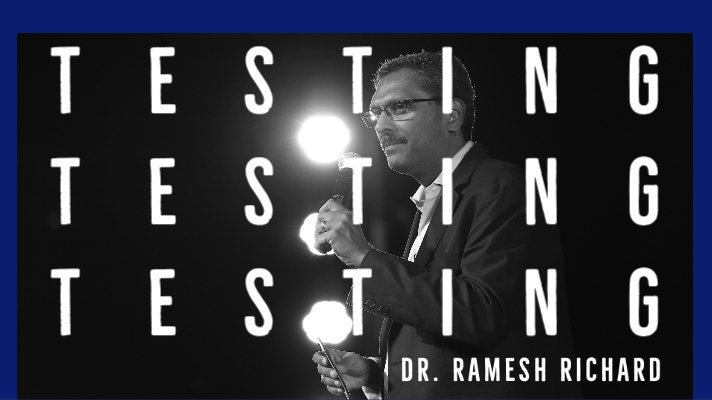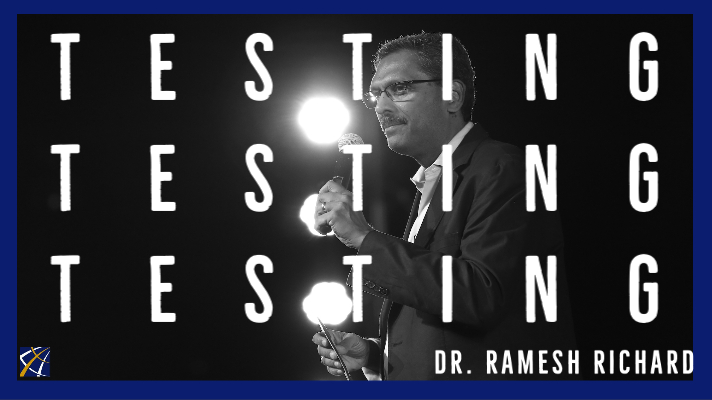
Testing, Testing, Testing…
August 7, 2020“Testing, Testing, Testing …” Part I – An Identity Check
August 20, 2020“Testing, Testing, Testing …” Part III – A Security Check
Testing, Testing, Testing… Global PAN(DEM)IC and a Sound Faith
Part III of III
Dr. Ramesh Richard
A Security Check
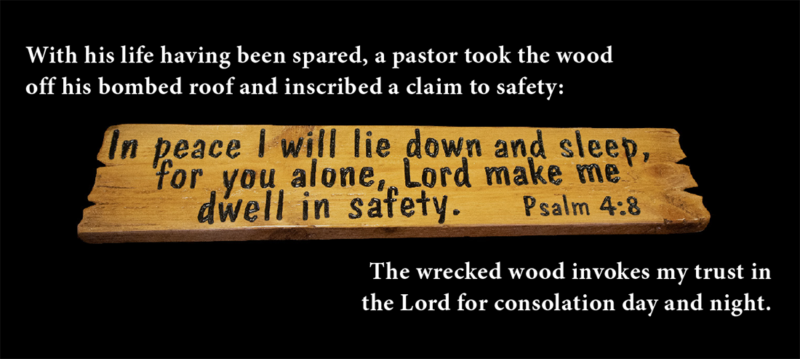
Security builds on survival—a basic human need—but takes a longer view. You and I have physically survived until now, or we wouldn’t be in dialogue. But physical survival does not guarantee security. The onslaught of a dangerous infectious agent threatens the physical health of tens of thousands, myself included. It also undermines economic and psychological safety.
“Shelter-in-place” mandates restrict current movement and activity in our city. Economic upheaval eerily looms over any benefits formerly afforded by economic freedom. The international supply chain is emptied of action, and government relief bills fail to restore confidence in financial markets. Our anxiety levels have soared, affecting our mental health. No one expected our seemingly stable world to be overturned so fast, so easily and so closely.
Longevity is not guaranteed. Any self-confident invincibility summarily departs at the widespread presence of an unseen, novel virus. The invisible enemy attacks our productivity, bringing on a realization of the eventuality of mortality. We will die sooner or later.
The current situation confirms that politics and economics may provide some guidance for survival but cannot serve as our final security. They can give us options but not directions for life. They can give us freedom but not hope for this life or the next. When we stand at disaster’s edge, any step forward with politics, economics or religion as the source of our security will be a suicidal misstep into the deep.
Maybe we should move backward and slow everything down to a stop. As we have.
This time of forced and unexpected shut-down is not for people to go to sleep and stay asleep. It is not for waiting to reboot just where we left off. We need to replace damaged and corrupt “security files.” Even before full functionality returns to society, we can restart life right away in “safe mode.”

In Christian conviction, an objectively based, biblical view of security founds and frames the strength of subjective wellbeing. It fortifies the only sense of security that survives this life into the next. The Trinitarian God again comes to the fore in the blessing of survival, safety and security of an eternal kind. As soon as our survival is secured for all time in his salvation, this day and tomorrow are taken care of as well.
For a third set of Scriptures, this time about the truths of eternal safety for believers, look up the verses I share, again with a cross-reference exercise. You can go to many more with dedicated study time. Your security forever is guaranteed in:
- God the Father’s eternal purpose (Rom. 8:28–30) and mighty power (1 Pet. 1:3–5) for us. All whom the Father called according to his purpose are glorified already.
- God the Son’s priestly intercession (Heb. 7:24–25) and protective involvement (John 10:28–29) for us. We can never be snatched from the hand of the Son.
- God the Spirit’s once-for-all regeneration (Tit. 3:5) and sealing (Eph. 4:30) of the believer. As in physical birth, once born, we can’t be pre-born, reborn or unborn.
A Trinitarian Christianity holds that God is committed to our security on earth and into heaven. Our security is based on his Son’s singular, decisive and victorious resurrection in defiance of our persistent and final vulnerability to physical death.
Even now, as I write from the back room of our house, I am comforted at the sight of a deeply meaningful gift from Eastern Ukraine. With his life having been spared, a pastor took the wood off his bombed roof and inscribed a claim to safety: “In peace I will lie down and sleep, for you alone, Lord, make me dwell in safety” (Ps. 4:8). The wrecked wood invokes my trust in the Lord for consolation day and night.
For a devotional workout throughout your stay-at-home, I invite you to stay in the book of the Psalms—my first resort and best reminder of security in tumultuous times. Because of the nature of divine truth and the commonality of human experience, you may distribute your anxiety to saints of old who will carry it along with you.
Type Psalms of Trust in your search engine. You will find dozens of websites counting and classifying them.1 Add Psalms of Thanksgiving to your search, and there will be many more to ponder. In addition, you can study one-off verses that fit the “trust, confidence, thanksgiving and assurance” motifs. You will be overwhelmed by the incredible declarations of divine security not only in the next life, but now.
A leading candidate for quiet reflection is the famous Psalm 46, Martin Luther’s psalm. God is our security—our refuge, strength and a very present help in trouble. God’s presence in my situations with me is my ultimate source of unflappable security. As kings and kingdoms fall forever, the Lord Almighty God secures his people. Do not overlook the latter part of the oft-quoted, assuring verse 10: “Be still and know that I am God; I will be exalted among the nations; I will be exalted in the earth” (italics added). Believers are to be still, to cease striving in anxiety and find security in the promise of our Lord, who will be exalted through this global devastation.
About 300 years ago, two young German Lutherans, aged 24 and 29, brought the good news to Southern India. My forefather, a fanner in the king’s court and a Hindu temple priest, embraced the gospel. His faith contagion continued across generations. It did not make me a Christian, but gave Christianity an advantage in my consideration of life and eternity.
It was not unusual to sing Luther’s hymn based on Psalm 46, “A Mighty Fortress,” at home and in church, mixing a German tune and words with Tamil phonology and pronunciation. The psalm and hymn became our quiet anthem as a minority in a majority culture that viewed Christians as followers of a foreign faith. Believers were wrongly considered as betrayers of the motherland, as those who had abandoned the religion of the soil. False motives of following Jesus for the sake of earthly gain (a.k.a. “Rice Christians”) were freely attributed. Many new Christians came from the ranks of the economically poor. The physical survival and security situation was exacerbated by catastrophes of drought and flood as well as genocidal killings of one to two million neighbors. All this to say that Christians have always lived in uncertain and insecure times. And their solitary comfort has been their God, whom they trust because of his Son’s victory over death through the resurrection and his current intercession at the right hand of the Father.
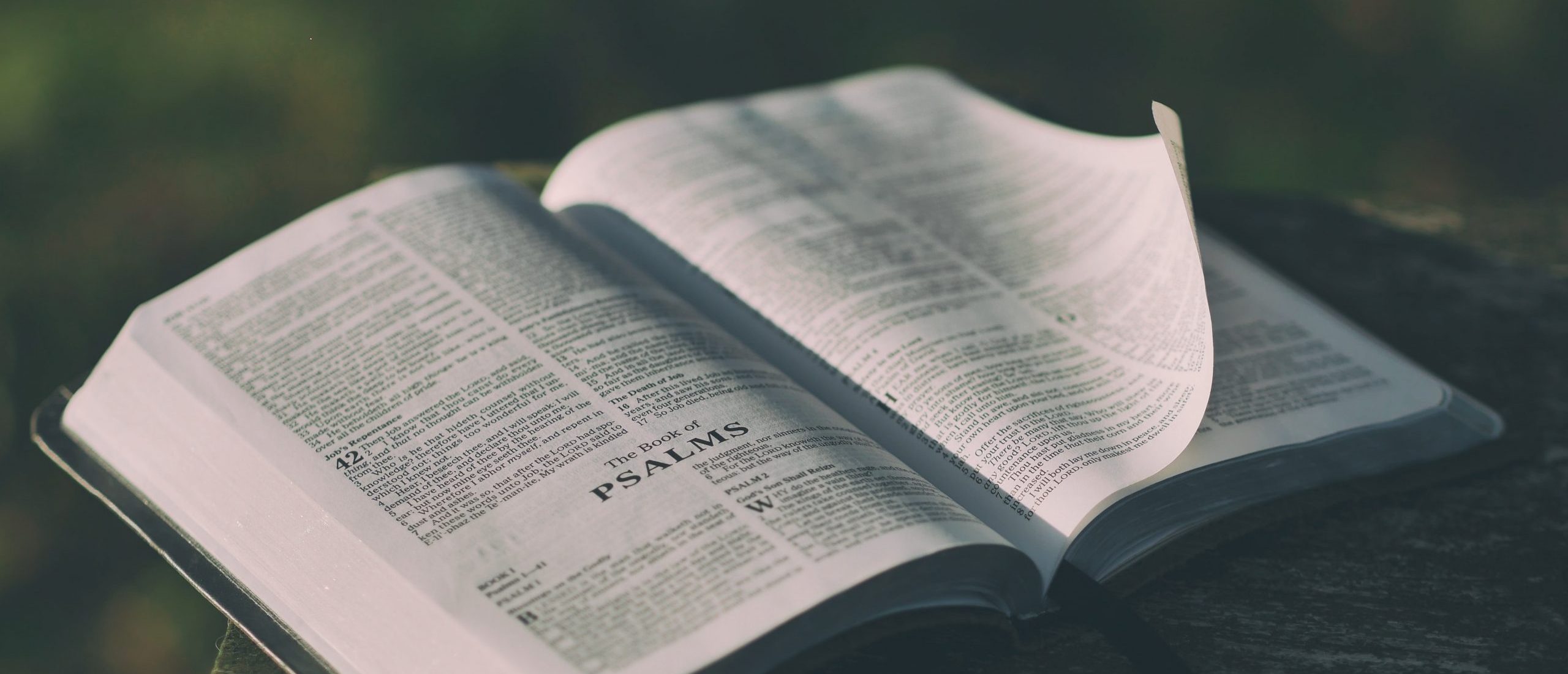
To parallel the extensive quote at the end of our first test, the identity check, I want you to learn from Luther’s hymn stanza by stanza, but only after you study Psalm 46 line by line. What do you think is the “one little word” in the last line of stanza two below? Sing it as loud as you can. I want to hear you at my home desk and harmonize with you. An emailed voice recording, maybe?
A mighty fortress is our God, a bulwark never failing;
Our helper He, amid the flood of mortal ills prevailing:
For still our ancient foe doth seek to work us woe;
His craft and pow’r are great, and, armed with cruel hate,
On earth is not his equal.
And though this world, with devils filled, should threaten to undo us,
We will not fear, for God hath willed His truth to triumph through us;
The Prince of Darkness grim, we tremble not for him;
His rage we can endure, for lo, his doom is sure,
One little word shall fell him.
That word above all earthly pow’rs, no thanks to them, abideth;
The Spirit and the gifts are ours through Him Who with us sideth;
Let goods and kindred go, this mortal life also;
The body they may kill: God’s truth abideth still,
His kingdom is forever.
An epic statement of apostle Paul fitly concludes the soundness of our Christian Faith in view of natural disaster. It also substantiates the security a believer finds in God’s indestructible love in Christ regardless of the situation. Notice Paul’s repetition, bolded for slow-learning, hesitant believers like me.
“For I am convinced that neither death, nor life, nor angels, nor principalities, nor things present, nor things to come, nor powers, nor height, nor depth, nor any other created thing, shall be able to separate us from the love of God, which is in Christ Jesus our Lord” (Rom. 8:38–39, NASB).
When my dear friend asked me that “what is God saying/doing to us” question, I was to leave the very next day on a 26-hour trip to a part of the world not yet exposed to (or more accurately, not tested for) the contagious new coronavirus. By the time of my return, the world had indelibly changed. God opened up an “impossible seat” and enabled me to catch the last flight home immediately before South Africa banned all flights for inbound and outbound non-citizens.
Johannesburg to London took about 10 hours, with a 5-hour transit to catch another 10-hour flight home. On the first flight, I slept. A hectic ministry schedule in Botswana—the hidden gem in southern Africa—left me tired. On the second flight, I wrote a list of 25 coronavirus tests for the quality of my Christian faith, some theological, others psychological and even philosophical. Many are subsumed under the three “checks” above.
I also wrote the following in my notebook: “I am in it. I don’t know if I have it. Or how long I have got, but we are all in it and don’t know if we have it or how long we’ve got.” Upon arrival in Dallas, passengers were greeted by CDC health personnel at the gate and the bottom and top of the escalators. One officer took my health declaration form and said, “You have traveled to a country with the outbreak and are at higher risk. Watch for symptoms and take your temperature twice a day.” I am doing just that.
I write this paragraph on the seventh day of consistent, sub-normal temperatures while practicing recommended prevention tactics and petitioning God for protection over me, my family and friends, and the rest of the world.
Did you hear of the bishop who kept tapping his microphone and observed, “There’s something wrong with this”? His people replied in liturgical rote, “And also with you.” Who would argue that there’s something wrong with you and me as we tackle a horrific situation? We are unable to directly right the wrong situation outside us. However, with the incredible spiritual resources God provides to pass our testing, testing, testing, we can certainly right what could be wrong within us. Let us have our identity increasingly confined only to what God says is true about us, our maturity progressively refined by the real troubles around us, and our security gradually defined by what God offers as enough right now and forever.
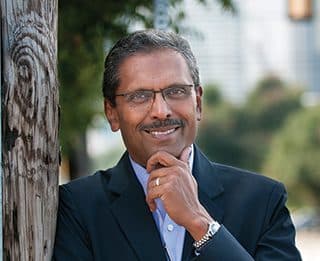
About the Author: Dr. Ramesh Richard serves as the founder and president of RREACH; general convener of the Global Proclamation Congress for Pastoral Trainers 2016; Professor of Global Theological Engagement and Pastoral Ministries at Dallas Theological Seminary; and founder and chairman of Trainers of Pastors International Coalition. He holds a Th.D. in Systematic Theology from Dallas Theological Seminary and a Ph.D. in Philosophy from the University of Delhi. To learn more about the ministry of RREACH, click here. For other articles from Dr. Ramesh Richard click here.

